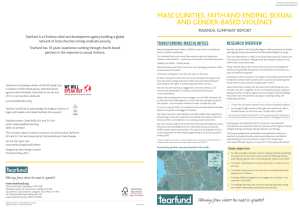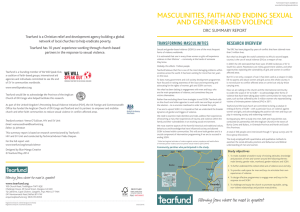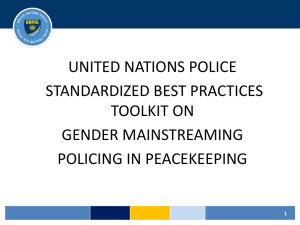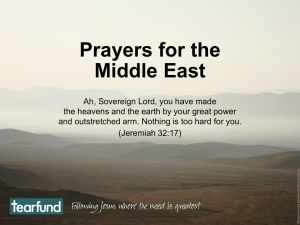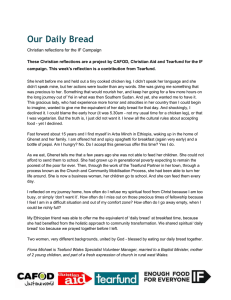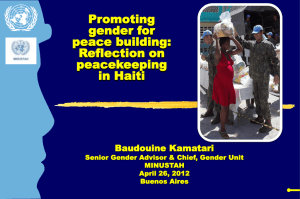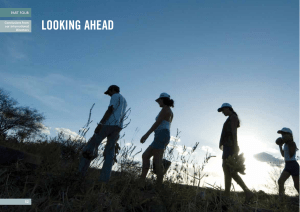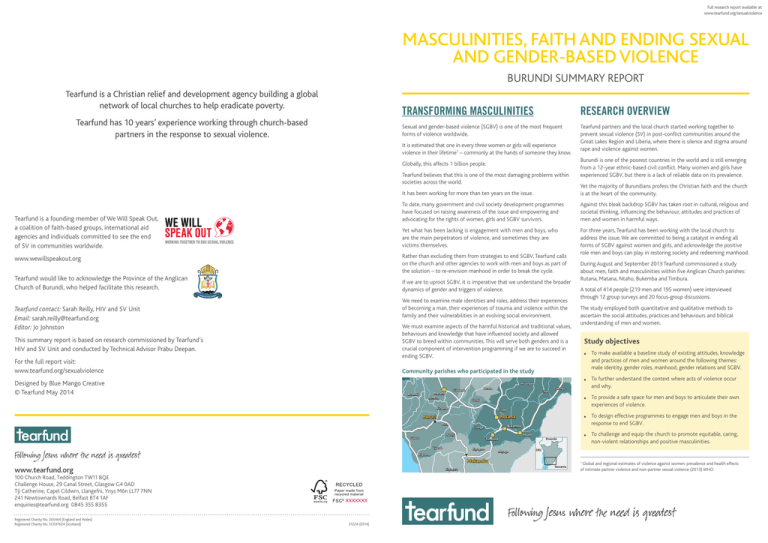
Full research report available at:
www.tearfund.org/sexualviolence
MASCULINITIES, FAITH AND ENDING SEXUAL
AND GENDER-BASED VIOLENCE
BURUNDI SUMMARY REPORT
Tearfund is a Christian relief and development agency building a global
network of local churches to help eradicate poverty.
Tearfund has 10 years’ experience working through church-based
partners in the response to sexual violence.
TRANSFORMING MASCULINITIES
RESEARCH OVERVIEW
Sexual and gender-based violence (SGBV) is one of the most frequent
forms of violence worldwide.
Tearfund partners and the local church started working together to
prevent sexual violence (SV) in post-conflict communities around the
Great Lakes Region and Liberia, where there is silence and stigma around
rape and violence against women.
It is estimated that one in every three women or girls will experience
violence in their lifetime1 – commonly at the hands of someone they know.
Globally, this affects 1 billion people.
Tearfund believes that this is one of the most damaging problems within
societies across the world.
Tearfund is a founding member of We Will Speak Out,
a coalition of faith-based groups, international aid
agencies and individuals committed to see the end
of SV in communities worldwide.
It has been working for more than ten years on the issue.
Yet the majority of Burundians profess the Christian faith and the church
is at the heart of the community.
To date, many government and civil society development programmes
have focused on raising awareness of the issue and empowering and
advocating for the rights of women, girls and SGBV survivors.
Against this bleak backdrop SGBV has taken root in cultural, religious and
societal thinking, influencing the behaviour, attitudes and practices of
men and women in harmful ways.
Yet what has been lacking is engagement with men and boys, who
are the main perpetrators of violence, and sometimes they are
victims themselves.
For three years, Tearfund has been working with the local church to
address the issue. We are committed to being a catalyst in ending all
forms of SGBV against women and girls, and acknowledge the positive
role men and boys can play in restoring society and redeeming manhood.
Rather than excluding them from strategies to end SGBV, Tearfund calls
on the church and other agencies to work with men and boys as part of
the solution – to re-envision manhood in order to break the cycle.
www.wewillspeakout.org
Tearfund would like to acknowledge the Province of the Anglican
Church of Burundi, who helped facilitate this research.
If we are to uproot SGBV, it is imperative that we understand the broader
dynamics of gender and triggers of violence.
We need to examine male identities and roles, address their experiences
of becoming a man, their experiences of trauma and violence within the
family and their vulnerabilities in an evolving social environment.
Tearfund contact: Sarah Reilly, HIV and SV Unit
Email: sarah.reilly@tearfund.org
Editor: Jo Johnston
We must examine aspects of the harmful historical and traditional values,
behaviours and knowledge that have influenced society and allowed
SGBV to breed within communities. This will serve both genders and is a
crucial component of intervention programming if we are to succeed in
ending SGBV.
This summary report is based on research commissioned by Tearfund’s
HIV and SV Unit and conducted by Technical Advisor Prabu Deepan.
For the full report visit:
www.tearfund.org/sexualviolence
A total of 414 people (219 men and 195 women) were interviewed
through 12 group surveys and 20 focus-group discussions.
The study employed both quantitative and qualitative methods to
ascertain the social attitudes, practices and behaviours and biblical
understanding of men and women.
Study objectives
To make available a baseline study of existing attitudes, knowledge
and practices of men and women around the following themes:
male identity, gender roles, manhood, gender relations and SGBV.
To further understand the context where acts of violence occur
and why.
Musongali
Buraza
Gisarenda
Matana
Burambi
Rumeza
To provide a safe space for men and boys to articulate their own
experiences of violence.
Gitaba
Bururi
To design effective programmes to engage men and boys in the
response to end SGBV.
Rutana
Buta
Bukemba
Gitanga
Rwanda
Timbura
Vyanda
To challenge and equip the church to promote equitable, caring,
non-violent relationships and positive masculinities.
Ntaho
Munini
Gatete
Following Jesus where the need is greatest
Giharo
Gakungu
Condi
Kiryama
Kayogoro
Muyaga
DRC
Kigwena
Makamba
www.tearfund.org
Registered Charity No. 265464 (England and Wales)
Registered Charity No. SC037624 (Scotland)
During August and September 2013 Tearfund commissioned a study
about men, faith and masculinities within five Anglican Church parishes:
Rutana, Matana, Ntaho, Bukemba and Timbura.
Community parishes who participated in the study
Designed by Blue Mango Creative
© Tearfund May 2014
100 Church Road, Teddington TW11 8QE
Challenge House, 29 Canal Street, Glasgow G4 0AD
Tŷ Catherine, Capel Cildwrn, Llangefni, Ynys Môn LL77 7NN
241 Newtownards Road, Belfast BT4 1AF
enquiries@tearfund.org 0845 355 8355
Burundi is one of the poorest countries in the world and is still emerging
from a 12-year ethnic-based civil conflict. Many women and girls have
experienced SGBV, but there is a lack of reliable data on its prevalence.
Kayogoro
XXXXXXX
31224-(0514)
Global and regional estimates of violence against women: prevalence and health effects
of intimate partner violence and non-partner sexual violence (2013) WHO
1
Tanzania
Following Jesus where the need is greatest
SUMMARY OF KEY FINDINGS
Despite the research results showing the challenging attitudes upheld by
both men and women, there was a collective will to change.
Most participants were not defensive about their beliefs and expressed a
need to change, even when justifying actions that were harmful to their
lives. This creates a unique opportunity for the church to work within
communities to transform social norms and influence culture for good.
KEY RECOMMENDATIONS
With the majority of Burundians professing the Christian faith, the church
has the power to break the negative cycle of SGBV that has permeated
society and culture.
Decision-making and domestic duties
1.Almost 100 per cent of both men and women agreed that a woman
should obey her husband.
It is clear that the church has some urgent work to do to restore a correct
biblical understanding of manhood and equality in all relationships
It must make up for lost time and change the skewed biblical
understanding which may have contributed to exacerbating violence.
2.Almost two thirds of men stated that the man should have the final
say in all family matters.
3.Women expressed concerns and fears about their husbands abusing
alcohol, engaging in extramarital relationships, polygamy and
transactional sex, which were corrupting family relationships and
impacting finances.
Here are the key research findings.
Gendered roles and attitudes
1.Men and women held strong attitudes on gendered roles, which
informed their work, roles and responsibilities within the home
and society.
2.Men and boys expressed frustration when they were unable to fulfil
the expectations of their families.
4.Decision making and control were linked to a skewed or partial
understanding of scripture, many citing only part of Ephesians 5:23:
‘For the husband is the head of the wife, as Christ is the head of the
church’, and failing to read the entirety of the scripture which goes on
to command man to respect his wife.
3.More than two thirds of women thought a husband should provide
economically for the family.
5.Attributes expressed in relation to ‘headship’ were of dominance,
control and power and violence.
4.A large percentage of men and women thought that a woman’s
primary role was cooking and taking care of the home.
6.Men articulated that the economic power within the home was
shifting due to male unemployment, and that women copied the
controlling model of headship.
5.The majority of women felt it was a mother’s responsibility to care
for the children. But this restricted men in their caregiving role and
prevented children from having positive relationships with fathers.
I think that a woman should obey her husband
For a full list of recommendations for the way forward, please see
Chapter Six of the research report.
Building awareness
Local pastors and men in the church are challenging harmful attitudes and behaviours regarding
gender roles after training. Photo: David Deakin/Tearfund.
5.A skewed belief that women were inferior, and men were entitled to
women as they were created as ‘helpers’, seemed to contribute to
harmful practices which lead to different forms of SGBV.
6.A culture of shame and stigma was associated with SGBV and
participants focused on the behaviour of the victim rather than the
perpetrator – 77 per cent of men and 95 per cent of women were in
agreement with the statement: “some women ask to be raped by the
way they dress and behave”.
I think that if a woman doesn’t physically fight back,
it’s not rape
6.Men and women linked their roles to the creation story in the Bible.
They believed that the scriptures taught that a woman was inferior or
unequal to a man, especially within marital relationships.
Male responses
Female responses
Education and training
There is a desperate need for sound theologically-based education and
training for church leaders and congregation members, which will have a
positive impact on society. The following areas urgently need addressing:
equality and equitable relationships, particularly within the story of
creation and New Testament teachings
fair and fulfilling roles in sex, marriage and family relationships
the need to redeem an understanding of manhood and masculinity,
through promoting Christlike equitable role models
a transformed understanding of what it means to be the head of the
household and promoting relationships of mutual respect and value
between husband and wife
Male responses
Female responses
Changing nappies, giving kids a bath and feeding the kids are the
mother’s responsibility
It is crucial that the church engages with other organisations, such as
civil society groups, non-governmental organisations, other faith-based
groups and government service providers, to educate men, women and
children on the different types of SGBV that can occur, and to promote
the laws, policies and services that are available to survivors.
Safe spaces
Male responses
Female responses
Agreed
Disagreed
Agreed
Disagreed
It is manly to defend the honor of your family even by
violent means
Responses to questions on current decision-making practices
Leadership
Who has the final say about decisions involving
how your family spends money on large
investments such as buying a vehicle,
a house or a household appliance?
Agreed
Disagreed
A woman’s most important role is to take care of her home and
cook for her family.
Male responses
Female responses
Male responses
Female responses
Who has the final say about decisions
involving how your family spends
money on food and clothing?
Who in your household usually has the final say
about decisions involving your children (their
schooling, their activities)?
Who in your household usually has the final say
regarding the health of women in the family?
Agreed
Tearfund believes that the church should always be a place where social
norms and attitudes can be challenged if they are causing harm
The Bible teaches that all humans should be treated with love and
respect and that men and women are created equal in the eyes of God
Disagreed
I think that some women ask to be raped by the way
they dress and behave
1.97 per cent of men and 95 per cent of women said it is manly to
defend the honour of the family, even by violent means.
Disagreed
The church needs to denounce violence in all forms and publicly reject
the norm that is attributing ‘manliness’ to violence. We need to invest
in leaders who live and demonstrate equitable attitudes, based on the
character, teachings and life of Christ. This will promote equitable, nondominating, non-violent relationships at all levels.
Mentorship
Men
Women
Violence, manhood and SGBV
Agreed
Churches, community-based groups and state-run projects need to
create safe spaces for men and boys, and SGBV survivors, to share
ongoing vulnerabilities and heal from their own traumatic experiences of
violence. This will facilitate a space for transformative masculinities and
bring an end to stigmatisation.
Male responses
Female responses
2.Men expressed the need to discipline their wives when they did
something dishonourable or wrong. They linked this to biblical
manhood and said that it was important to show this in front of
children and the community to maintain respect and control.
Inaccessible areas
The church is the only institution accessible to people in remote areas,
and it is imperative that the church works in partnership with local and
national administrative and judicial bodies to respond to incidents of
SGBV and promote an understanding of all of the above.
Partnerships
It is important that non-faith-based organisations (non-FBOs)
acknowledge that there is scope and willpower to change from within the
church, and find common ground to work together to end SGBV.
3.89 per cent of men and 93 per cent of women said that if a victim
didn’t physically fight back, it wasn’t rape.
4.Women thought that a woman cannot be raped by her husband as
they believed her body belonged to him according to the scriptures.
There need to be programmes for young people on positive masculinities,
and pre- and post-marriage counselling for couples, which focus on
positive aspects of relationships and family well-being.
Agreed
Disagreed
Churches and non-FBOs need to form coalitions and collaborate with
other key organisations on advocacy efforts to influence national policy
and practices.

